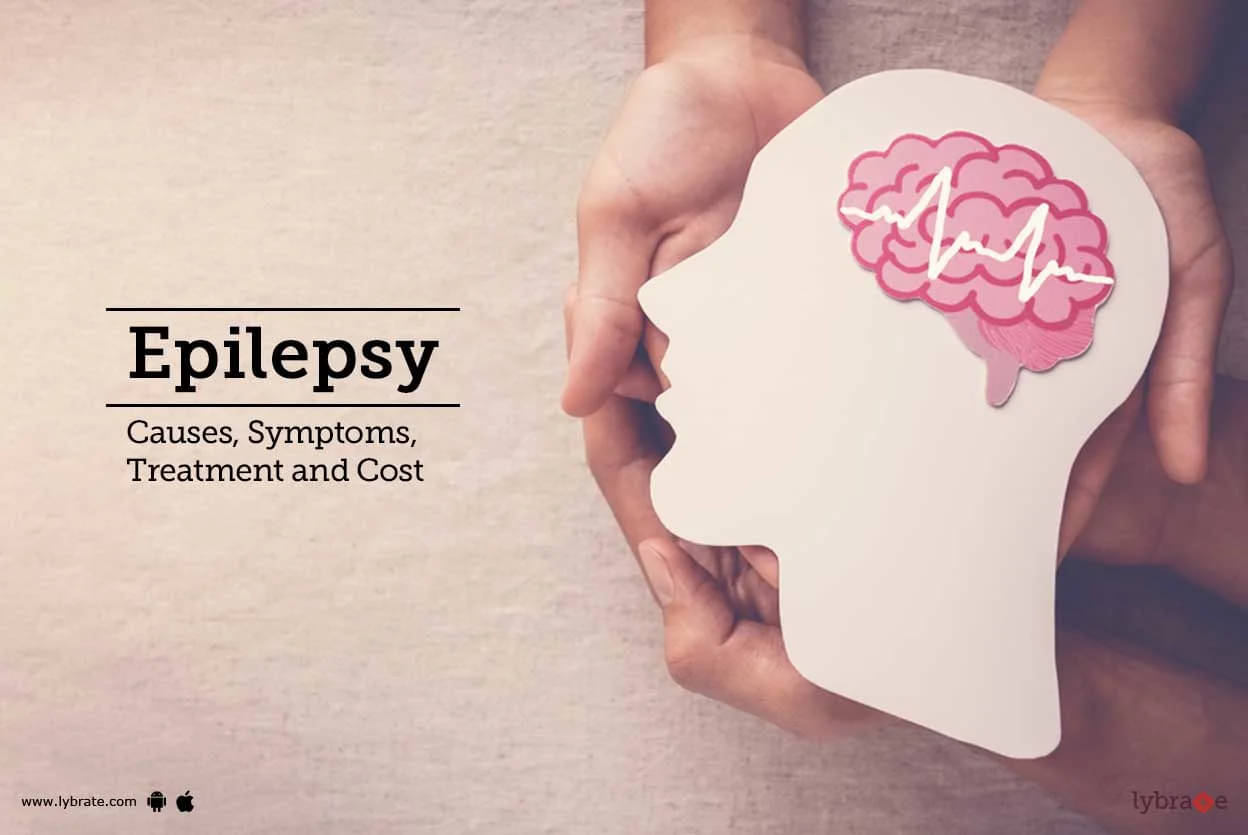Epilepsy: Causes, Symptoms, Treatment and Cost
Last Updated: Jul 06, 2023
What is Epilepsy?
Recurrent seizures are a defining feature of the nervous system disorder epilepsy. Seizures are sudden, brief episodes of altered brain activity that can cause a variety of symptoms, such as muscle twitching, changes in behavior or consciousness, and sensory disturbances.
Numerous things, including heredity, head trauma, and abnormalities of the brain, can result in epilepsy. It can damage persons of all ages and significantly lower their quality of life. Epilepsy can be treated in a variety of ways, including with drugs and surgery.
Types of Epilepsy
There are several different types of epilepsy, and the type of epilepsy a person has can influence their treatment options and outlook.
Partial seizures
Partial seizures or commonly known as Focal seizures, start in a particular region of the brain. Simple partial seizures and complex partial seizures are the two varieties of partial seizures.Simple partial seizures can cause symptoms including twitching muscles, tingling, or abnormalities in vision but do not cause loss of consciousness.
Complex partial seizures, on the other hand, cause a loss of consciousness and may involve symptoms such as staring spells, lip smacking, or repetitive movements.
Generalized seizures
Generalized seizures, on the other hand, involve both sides of the brain and may cause a loss of consciousness. There are several types of generalized seizures, including;
- Tonic-clonic seizures, which cause muscle stiffness and convulsions
- Absence seizures, which cause brief periods of unconsciousness and may be accompanied by eye fluttering
- Myoclonic seizures, which cause sudden, brief muscle jerks
- Clonic seizures, which cause repeated muscle jerks
- Tonic seizures, which cause muscle stiffness
- Atonic seizures often referred to as drop attacks, result in an abrupt decrease of muscular tone and can lead to falls
Other types of Epilepsy
There are various more varieties of epilepsy that are categorized according to the particular signs and features of the seizures, in addition to partial and generalized seizures. These epilepsy types could consist of;
- Frontal lobe epilepsy, which can cause behavioral or emotional problems as a result of seizures that start in the frontal lobe of the brain
- Temporal lobe epilepsy, seizures that start in the temporal lobe of the brain and may include hallucinations or altered feelings
- Juvenile myoclonic epilepsy, Myoclonic seizures are a hallmark of juvenile myoclonic epilepsy, which often first manifests in adolescence
- Lennox-Gastaut syndrome, the severe form of epilepsy known as Lennox-Gastaut syndrome, which often develops in childhood and is marked by a variety of seizures, including absence seizures and tonic-clonic seizures
- It is important to note that the classification of epilepsy is constantly evolving as more is learned about the condition.
What causes Epilepsy?
Although the precise cause of epilepsy is frequently unknown, aberrant brain activity is thought to be a possible connection. Some common causes of epilepsy include genetics, head injuries, brain infections, and brain abnormalities.
What are the symptoms of Epilepsy?
Depending on the sort of seizure a person has, epilepsy symptoms might change. Some common symptoms may include;
- Convulsions
- Loss of consciousness
- Abnormal behavior
- Abnormal sensations
What are the Risk Factors of Epilepsy?
There are several factors that may increase a person's risk of developing epilepsy, including genetics, head injuries, and certain medical conditions. Because epilepsy is more prevalent in younger children and older adults, age is also a risk factor.
How can you prevent Epilepsy?
Since the precise cause of epilepsy is frequently unknown, there is no established technique to stop it. However, there are some things that may help to reduce the risk of developing epilepsy, such as avoiding head injuries, getting timely treatment for medical conditions, and following a healthy lifestyle.
Do
Wear a helmet when participating in activities that carry a risk of head injurySeek medical attention for infections or medical conditions that may affect the brain
Follow a healthy lifestyle, including eating a balanced diet, exercising regularly, and not smoking or drinking excessively
Don’t
- Avoid activities that carry a high risk of head injury, such as contact sports or extreme sports
- Avoid excessive drinking or smoking as these vices can raise your chance of epilepsy
Epilepsy - Diagnosis and Tests
Epilepsy can be challenging to diagnose since its symptoms often resemble those of other diseases. A physical examination and the gathering of medical history are usually the first steps taken by a healthcare professional. To aid in the diagnosis, they may also request testing like an electroencephalogram (EEG) or brain imaging exams.
What are possible complications of Epilepsy?
Epilepsy can cause a number of complications, including:
- Injury: Seizures can cause falls or accidents, which can lead to injuries.
- Cognitive problems: Epilepsy can also cause cognitive problems, such as memory loss or difficulty with attention and concentration.
- Emotional problems: Living with epilepsy can be stressful, and some people may experience emotional problems such as depression or anxiety.
Home Remedies for Epilepsy?
There are no known home remedies that can cure epilepsy, but there are some things that may help to manage the condition and reduce the frequency of seizures. These may include:
- Getting enough sleep: Lack of sleep can trigger seizures, so it is important to get enough rest.
- Avoiding triggers: Certain triggers, such as flashing lights or certain drugs, may produce seizures in some epileptics. Preventing these triggers can aid in seizure prevention.
- Practicing relaxation techniques: Deep breathing exercises and meditation can help lower the risk of seizures because stress can cause them.
What to eat in Epilepsy?
People with epilepsy need to eat a healthy, balanced diet because some foods might cause seizures. Some tips for eating well with epilepsy include:
- Eat regular meals: Skipping meals or going too long without eating can trigger seizures, so it is important to eat regular meals throughout the day.
- Choose healthy, whole foods: Foods such as fruits, vegetables, and whole grains are rich in nutrients and can help to keep blood sugar levels stable, which can help to prevent seizures.
- Limit processed foods: Processed foods, such as packaged snacks and fast food, can be high in sugar and additives, which can trigger seizures.
What not to eat in Epilepsy?
There are some foods that may trigger seizures in some people with epilepsy, so it is important to be aware of these and avoid them if necessary. Some common seizure triggers include:
- Alcohol: Alcohol can interact with certain epilepsy medications and may increase the risk of seizures.
- Caffeine: Caffeine can also interact with certain epilepsy medications and may increase the risk of seizures.
- Artificial sweeteners: Aspartame, one type of artificial sweetener, has been associated with seizures in some persons.
Epilepsy Treatments
Depending on the individual's demands and the severity of the ailment, epilepsy treatment can vary. Some common treatment options include:
- Medications: Antiepileptic drugs can help to lessen both the frequency and the intensity of seizures.
- Surgery: In some circumstances, removing the portion of the brain causing seizures may be a possibility.
- Alternative therapies: Acupuncture or chiropractic treatment may be able to help some persons with epilepsy.
Which doctor to consult for Epilepsy?
A neurologist is a specialist who is trained to diagnose and treat brain disorders, including epilepsy. To choose the best course of action for a person with epilepsy, it is crucial to review treatment alternatives with a healthcare professional.
Which are the best medicines for Epilepsy?
There is no one 'best' medication for epilepsy, as treatment will depend on the specific needs of the person with the condition. Typical drugs for the management of epilepsy include;
- Carbamazepine
- Lamotrigine
- Phenytoin
- Valproic acid
It's crucial to collaborate with a healthcare professional to choose the appropriate epilepsy treatment strategy.
How long does it take to recover from Epilepsy?
Although epilepsy is a chronic disorder that cannot be cured, therapy can help control it. With the right care, many epileptics can have normal, fulfilling lives and may experience fewer seizures. However, the length of time it takes to recover from epilepsy will depend on the severity of the condition and the effectiveness of treatment.
Are the results of the treatment permanent?
In many cases, the results of treatment for epilepsy are not permanent, and people may continue to experience seizures even with treatment. However, the frequency and severity of seizures may be significantly reduced with treatment, allowing people with epilepsy to live normal, productive lives.
Who is eligible for the treatment?
Most people with epilepsy are eligible for treatment, although the specific treatment plan will depend on the severity of the condition and the person's specific needs. To choose the best course of action for a person with epilepsy, it is crucial to review treatment alternatives with a healthcare professional.
Who is not eligible for the treatment?
It's critical to adhere to instructions given by a healthcare professional after beginning epilepsy treatment in order to effectively manage the disease. It is important to discuss treatment options with a healthcare provider to determine the best plan for an individual with epilepsy.
What are the post-treatment guidelines?
It's critical to adhere to instructions given by a healthcare professional after beginning epilepsy treatment in order to effectively manage the disease. This may include taking medications as prescribed, avoiding triggers that can cause seizures, and getting regular check-ups to monitor the condition.
What is the price of Epilepsy treatments in India?
Depending on the particular treatment plan, the location, and the kind of healthcare facility, the cost of epilepsy treatment in India can change. On average, epilepsy treatment may cost around INR 2,71,500. Deep brain stimulation, a surgical treatment for epilepsy that involves implanting electrodes in the brain to control seizures, may cost around INR 7,00,000. The price of epilepsy surgery in India, which may be used to remove a part of the brain that is causing seizures, may be anywhere between INR 2,00,000 and INR 2,50,000. Working with a healthcare professional to calculate the cost of treatment and look into any available financial help options is crucial.
What are side-effects of Epilepsy treatments?
Like all treatments, antiepileptic medications used to treat epilepsy might have side effects. Some common side effects may include:
- Dizziness
- Drowsiness
- Nausea
- Rash
It is important to discuss the potential side effects of any medication with a healthcare provider before starting treatment.
Epilepsy - Outlook / Prognosis
The prognosis for epilepsy sufferers might differ significantly depending on the severity of the ailment and the efficacy of treatment. Many epileptics are able to lead normal, fulfilling lives and may have fewer seizures with the right care. Even with medication, some persons with epilepsy may still experience seizures because it is a chronic disorder that cannot be cured. Yes, a lot of people with epilepsy can lead fulfilling lives with the right care and management.
References
- Epilepsy- Medline Plus, Health Topics, NIH, U.S. National Library of Medicine [Internet]. medlineplus.gov 2019 [Cited 27 July 2019]. Available from:
- Epilepsy - overview- Medline Plus, Medical Encyclopedia, NIH, U.S. National Library of Medicine [Internet]. medlineplus.gov 2019 [Cited 27 July 2019]. Available from:
- The Epilepsies and Seizures: Hope Through Research- NIH, National Institute of Neurological Disorders and Stroke [Internet]. ninds.nih.gov 2019 [Cited 26 July 2019]. Available from:
Table of content
15+ Years of Surgical Experience
All Insurances Accepted
EMI Facility Available at 0% Rate
Find Neurologist near me
Ask a free question
Get FREE multiple opinions from Doctors


